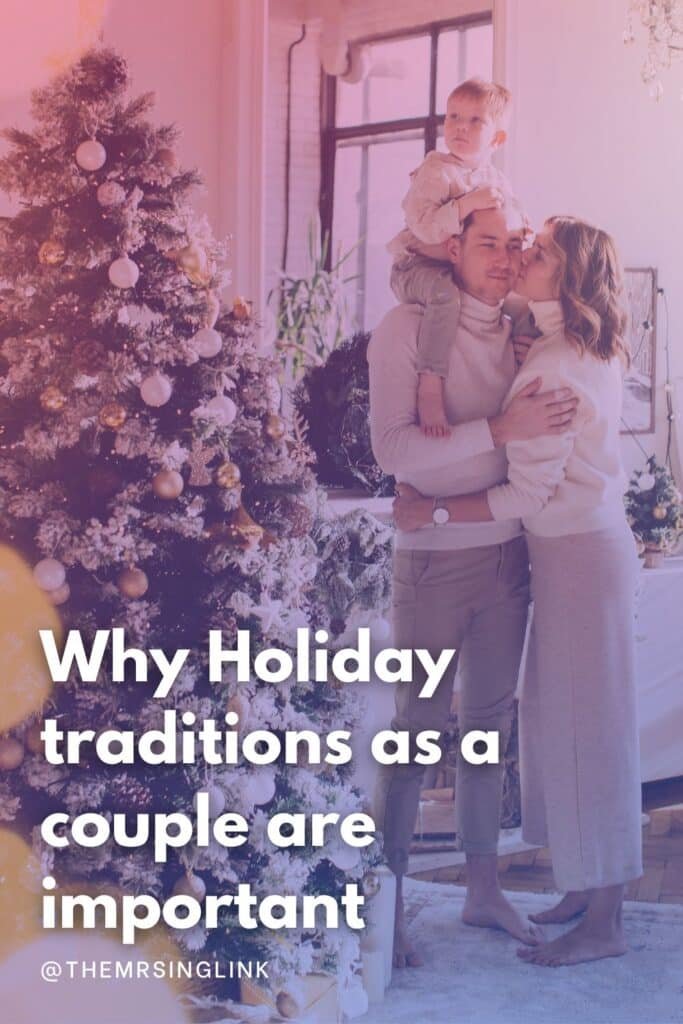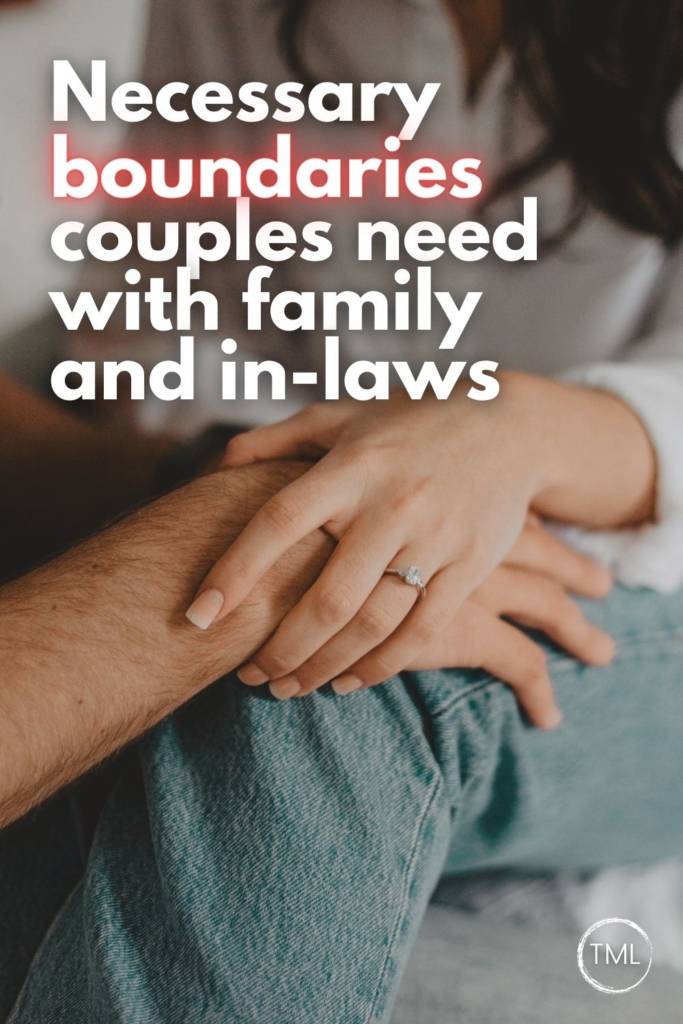Thanksgiving and Christmas are the two major Holidays for couples and new relationships where it may seem like you’re stepping on one another’s toes. Whether you celebrate the Holidays or not, it’s important to consider your own Holiday traditions, together, as a couple.
In a previous post, I talked about how the Holidays can make or break new relationships. Regardless of how joyous and giving this time of year is supposed to be, the Holidays can also bring tension among couples, and new relationships. *Families, too.
As a married woman, my family has now doubled, but as far as having to share the Holidays with two families as well as devote to the one my husband and I are now – it can still be stressful. Some years I just want to forgo celebrating them at all.
That said, this is the perfect message for couples who may be struggling with sharing or splitting the Holidays. Or when one spouse seems to dominate the Holiday festivities year after year. Unfortunately this is way more common than anticipated.
Now just shy of 10 years married, I have a better understanding of the meaning behind Holiday expectations, boundaries, and the importance of prioritizing the traditions between my husband and I (our individual family unit).
It’s important for couples to have their own Holiday traditions (apart from inherited or familial ones)

Holiday stress can strain any relationship
Not everyone grows up with the same core family values (including around the Holidays), nor do we all share the same Holiday traditions. The Holidays themselves may not even be a happy time of year for many, but a time of obligation, appeasement, peace-keeping, false joy and added stress/turmoil.
Many have big families with yearly traditions, while some may have no relations with their immediate or extended family at all. With that, some may not have strict Holiday traditions or any during the Holiday season. It isn’t as uncommon as you think for people to not recognize or celebrate major Holidays the way many do, or as movies portray. You also need to factor in that some may not have the luxury of having time off work.
Differences in family dynamics, as well as Holiday expectations and traditions can put an unnecessary strain on couples. With financial stress being a factor, family pressure and personal satisfaction are other interrupted voids we fill during the Holiday season.
For couples sharing or splitting the Holiday season, some may have no trouble at all while others often find themselves wedged between guilt and dissatisfaction. More sacrifices are being made this time of year, and it isn’t always easy if one partner is seemingly receiving the short end of the stick. Then we’re left with unmet needs and possible resentment if this is ongoing year after year, even if we end up sweeping it under the rug only for it to resurface the following year. Ah, the strain.
With the added pressure from extended family, there’s a tug-o-war between avoiding disappointment and keeping the peace when attempting to satisfy the expectations of others. You know, because you’ll never hear the end of it from your mother if you miss Thanksgiving dinner that is promptly at 4 o’clock every year.
The big question for couples is how to avoid the strain? Well, I don’t think it’s fully possible to avoid; it’s more realistic to minimize its effects. First, it’s important to discuss your Holiday traditions as well as to take the pressure off of Holiday expectations, such as expecting your partner to attend your big, family Christmas party (as in, no other plans are allowed to interfere or supersede). I know, I’m sorry for ruffling some feathers there.
With my husband’s job (and mine at the time when we met), it wasn’t unusual for us to have to work on major Holidays. Early on in our relationship we also didn’t pressure one another into sacrificing Holiday expectations. We didn’t start conjoining the Holidays until well into our relationship, and we also didn’t create our own separate traditions until we got engaged.
Sometimes we have to realize that the strain stems from over-romanticizing the Holidays and expecting things to go our way when its just not possible. Nonetheless, there are still Holidays I spend without my husband (when he works), but we remain forgiving and make it work together in our own least stressful way.

One’s family is not more important than the other’s
And this is the truth – whether you’re an only child or that of 133 cousins, 38 aunts and uncles, and 8 brothers and sisters. If you’re married, multiply that by two. So when you’re in a relationship, you may ultimately be battling up to 4 families during the Holidays if you’re counting divorced households or more extended families.
It simply may not be possible to divide the time evenly or fairly, especially when time off work or airfare is involved. What’s most important is ensuring that you and your partner have this understanding, and not to minimize one another’s family values and Holiday traditions over the other. Hence the significance and respect of boundaries with family, in-laws and your partner as well.
Individually and as a couple, you should discuss what is or isn’t necessary in terms of each of your Holiday expectations and traditions. Keeping an open mind is key here, where the focus is less on gatekeeping and more on fairness. This one’s for those who tend to assume the longer stick by default, because they’ve taken it upon themselves to elevate their Holiday expectations (or to appease their families’ expectations) over their partner’s.
This means neither partner automatically (or by default) gets a pass, has the say or last word, the leg up or long end of the stick.

There’s value in the big things and the little things
I can imagine there are those out there who couldn’t fathom staying home for Christmas, or only doing one household Thanksgiving day. These are the go big or go home individuals, traveling to and fro year after year. Then there are those who are the opposite – it’s tough to get them out of their tiny bubble.
Either way, both have value. Everyone’s traditions means something to them, and they have significance. But how quick are we to elevate our own over our partner’s? Be honest.
“Well, my grandmother is sick – we don’t know how many Christmases we have left with her,“
“My entire dad’s side always does the big Thanksgiving shin-dig since I can remember – they’d be heartbroken if I didn’t go,“
“I don’t get to see my extended family too often because they live far away, so….,”
While there may be exceptions, but are these exceptions expected year after year? We, individually, define what’s important to us…and often at the expense of devaluing what matters to our partner.
While much of my young adulthood I spent the Holidays with just my parents (which, to many may seem like nothing or no big deal), I couldn’t imagine giving up every Holiday for my spouse simply because he had bigger, more elaborate family traditions. Granted, to many it would seem like I’m giving up far *less* than my spouse; meaning my little mom-and-dad family tradition has less value than my husband’s big, elaborate family tradition.
There are definitely scenarios like this that flood the Holiday season between couples. One partner will say, “It’s just dinner at your mom’s house (just her). It’s no big deal if you skip out again (this year),” or “You know how much effort my mom goes into planning her big family gathering on Thanksgiving each year – she’d be devastated if I didn’t show because we went to your mom’s instead,” in order to imply that their family traditions are more significant in value. This spouse is also implying that the appeasement of their extended family – their mother’s strict holiday expectations – is their priority over disappointing their spouse.
So, here’s the big point on a little thing. If I wanted to spend Christmas Day in the comfort of our home with just my husband, go no where and visit no one, that has the same value as my husband’s yearly week-long family union for Christmas.

Mutual satisfaction will require compromise
Like in every aspect of relationships, meeting each other’s Holiday expectations will require some level of sacrifice and compromise. The part nobody likes to hear, or endure, is that this may mean having to disappoint others, and in doing so potentially create tension during a time of year that is supposed to bring about peace and joy.
Whether that means you rotate each year whose family does what and gets what day, or splitting up the time based on your schedules. Ideally, you should be picking and choosing what aspects are most important to both of you while accepting that you may not get everything or exactly how you want it. At least, maybe not every year.
Like I said above, unless the pressure is off and you don’t mind spending the Holidays entirely one way (sided) or totally separate from each other, it’s still likely that one partner is doing more of the compromising over the other, or getting the short end of the stick. So let’s be more mindful of that.
Also, let’s not forget that compromise has no limitations. It may not always be perfectly down the middle, nor should it always be unfairly one sided year after year.
Sometimes our traditions and expectations won’t make sense
Yeah, I said it. Some things just won’t be realistic, and won’t make sense, so why is that suddenly not ok just because its the Holidays?
Your family lives a plane ticket away while your partner’s parents live in town, and you don’t have the expenses to travel far and wide each year to visit your family for the Holidays, even though they anticipate you to.
It just doesn’t make sense to host Christmas dinner after you recently had a baby.
It’s not realistic to spend gobs of money and go all out for the Holidays when your partner recently lost their job.
It doesn’t make sense financially to travel to see your partner’s family for the Holidays this year.
It’s just not realistic traveling to multiple households on Thanksgiving day with multiple young children this year.
I’ll say it again: sometimes some things just won’t make sense, with or without a reason. As a couple, you’re inevitably going to stumble across these circumstances, and it’s important that you embrace them together with grace and understanding.

